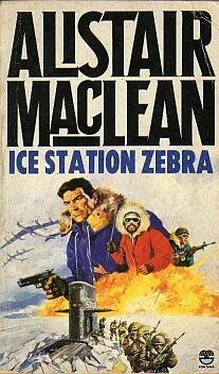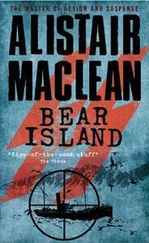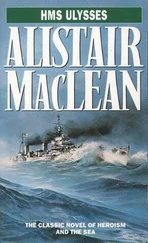Alistair MacLean - Ice Station Zebra
Здесь есть возможность читать онлайн «Alistair MacLean - Ice Station Zebra» — ознакомительный отрывок электронной книги совершенно бесплатно, а после прочтения отрывка купить полную версию. В некоторых случаях можно слушать аудио, скачать через торрент в формате fb2 и присутствует краткое содержание. Год выпуска: 1963, Жанр: Триллер, Боевик, на английском языке. Описание произведения, (предисловие) а так же отзывы посетителей доступны на портале библиотеки ЛибКат.
- Название:Ice Station Zebra
- Автор:
- Жанр:
- Год:1963
- ISBN:нет данных
- Рейтинг книги:3 / 5. Голосов: 1
-
Избранное:Добавить в избранное
- Отзывы:
-
Ваша оценка:
- 60
- 1
- 2
- 3
- 4
- 5
Ice Station Zebra: краткое содержание, описание и аннотация
Предлагаем к чтению аннотацию, описание, краткое содержание или предисловие (зависит от того, что написал сам автор книги «Ice Station Zebra»). Если вы не нашли необходимую информацию о книге — напишите в комментариях, мы постараемся отыскать её.
Ice Station Zebra — читать онлайн ознакомительный отрывок
Ниже представлен текст книги, разбитый по страницам. Система сохранения места последней прочитанной страницы, позволяет с удобством читать онлайн бесплатно книгу «Ice Station Zebra», без необходимости каждый раз заново искать на чём Вы остановились. Поставьте закладку, и сможете в любой момент перейти на страницу, на которой закончили чтение.
Интервал:
Закладка:
He began to ease Folsom into a sitting position and I helped him. He slid down himself, his back to the wall. "Sorry and all that, you know," he said. His bearded frost-bitten face twisted into the semblance of a grin. "A poor host."
"You can leave everything to us now, Dr. Jolly," Swanson said quietly. "You've got all the help that's going. One thing. All those men fit to be moved?"
"I don't know." Jolly rubbed an arm across bloodshot, smudged eyes. "I don't know. One or two of them slipped pretty far back last night. It's the cold. Those two. Pneumonia, I think. Something an injured man could fight off in a few days back home can be fatal here. It's the cold," he repeated. "Uses up ninety per cent of his energy, not in fighting illness and infection, but just generating enough heat to stay alive."
"Take it easy," Swanson said. "Maybe we'd better change our minds about that half-hour to get you all aboard. Who's first for the ambulance, Dr. Benson?" Not Dr. Carpenter. Dr. Benson. Well, Benson was his own ship's doctor. But pointed, all the same. A regrettable coolness, as sudden in its onset as it was marked in degree, had appeared in his attitude toward me, and I didn't have to be beaten over the head with a heavy club to guess at the reason for the abrupt change.
"Zabrinski, Dr. Jolly, Captain Folsom, and this man here," Benson said promptly.
"Kinnaird, radio operator," Kinnaird identified himself. "We never thought you'd make it, mate." This to me. He dragged himself somehow to his feet and stood there swaying. "I can walk."
"Don't argue," Swanson said curtly. "Rawlings, stop stirring that filthy mush and get to your feet. Go with them. How long would it take you to run a cable from the boat, fix up a couple of big electric heaters in here, some lights?"
"Alone?"
"All the help you want, man."
"Fifteen minutes. I could rig a phone, sir."
"That would be useful. When the stretcher bearers come back, bring blankets, sheets, hot water. Wrap the water containers in the blankets. Anything else, Dr. Benson?"
"Not now, sir."
"That's it, then. Away you go."
Rawlings lifted the spoon from the pot, tasted it, smacked his lips in appreciation, and shook his head sadly. "It's a crying shame," he said mournfully. "It really is." He went out in the wake of the stretcher bearers.
Of the eight men left lying on the floor, four were conscious. Hewson, the tractor driver, Naseby, the cook, and two others who introduced themselves as Harrington. Twins. They were as alike as two freshly minted pennies, they'd even been burnt and frost-bitten in the same places. The other four were either sleeping or in coma. Benson and I started looking them over, Benson much more carefully than myself, very busy with thermometer and stethoscope. Looking for signs of pneumonia. I didn't think he'd have to look very far. Commander Swanson looked speculatively around the cabin, occasionally throwing a very odd look in my direction, occasionally flailing his arms across his chest to keep the circulation going. He had to. He didn't have the fancy furs I had, and in spite of the solid-fuel stove, the place was like an icebox.
The first man I looked at was lying on his side in the far right-hand corner of the room. He had half-open eyes, iust showing the lower arcs of his pupils, sunken temples, marblewhite forehead, and the only part of his face that wasn't bandaged was as cold as the marble in a winter graveyard. I said, "Who is this?"
"Grant. John Grant." Hewson, the dark, quiet tractor driver, answered me. "Radio operator. Kinnaird's sidekick. How's it with him?"
"He's dead. He's been dead quite some time."
"Dead?" Swanson said sharply. "You sure?" I gave him my aloof professional look and said nothing. He said to Benson, "Anybody too ill to be moved?"
"Those two here, I think," Benson said. He wasn't noticing the series of peculiar looks SWanson was letting me have, so he handed me his stethoscope. After a minute I straightened and nodded.
"Third-degree burns," Benson said to Swanson. "What we can see of them, that is. Both high temperatures, both very fast, very weak, and erratic pulses, both with lung fluids."
"They'd have a better chance inside the «Dolphin»," Swanson said.
"You'd kill them getting there," I said. "Even if you could wrap them up warmly enough to take them back to the ship, hauling them up to the top of the sail and -then lowering them vertically through those hatchways would finish them off."
"We can't stay out in that lead indefinitely," Swanson said. "I'll take the responsibility for moving them."
"Sorry, Captain." Benson shook his head gravely. "I agree with Dr. Carpenter."
Swanson shrugged and said nothing. Moments later the stretcher bearers were back, followed soon after by Rawlings and three other enlisted men carrying cables, heaters, lamps, and a telephone. It took only a few minutes to connect the heaters and lamps on to the cable. Rawlings cranked the callup generator of his field phone and spoke briefly into the mouthpiece. Bright lights came on and the heaters started to crackle and, after a few seconds, glow.
Hewson, Naseby, and the Harrington twins left by stretcher. When they'd gone, I unhooked the Coleman lantern. "You won't be needing this now," I said. "I won't be long."
"Where are you going?" Swanson's voice was quiet.
"I won't be long," I repeated. "Just looking around."
He hesitated, then stood to one side. I went out, moved around a corner of the hut, and stopped. I heard the whirr of the call-up bell, a voice on the telephone. It was only a murmur to me, I couldn't make out what was being said. But I'd expected this.
The Coleman storm lantern flickered and faded in the wind but didn't go out. Stray ice spicules struck against the glass, but it didn't crack or break; it must have been one of those specially toughened glasses immune to a couple of hundred degrees' temperature range between the inside and the outside.
I made my way diagonally across to the only hut left on the south side. No trace of burning, charring, or even smokeblackening on the outside walls. The fuel store must have been the one next to it, on the same side and to the west, straight downwind; that almost certainly must have been its position judging by the destruction of all the other huts, and the grotesquely buckled shape of its remaining girders made this strong probability a certainty. Here had been the heart of the fire.
Hard against the side of the undamaged hut was a lean-to shed, solidly built. Six feet high, six wide, eight long. The door opened easily. Wooden floor, gleaming aluminum for the sides and ceiling, big black heaters bolted to the inside and outside walls. Wires led from those, and it was no job for an Einstein to guess that they led — or had led — to the now destroyed generator house. This lean-to shed would have been warm night and day. The squat, low-slung tractor that took up nearly all the floor space inside would have started any time at the touch of a switch. It wouldn't start at the turn of a switch now; it would take three or four blowtorches and the same number of strong men even to turn the engine over once. I closed the door and went into the main hut.
It was packed with metal tables, benches, machinery, and every modern device for the automatic recording and interpretation of every conceivable observed detail of the Arctic weather. I didn't know what the functions of most of the instruments were and I didn't care. This was the meteorological office and that was enough for me. I examined the hut carefully but quickly, and there didn't seem to be anything odd or out of place that I could see. In one corner, on an empty wooden packing case, was a portable radio transmitter with listening phones — "transeivers," they called them nowadays. Near it, in a box of heavy oiled wood, were fifteen Nife cells connected up in series. Hanging from a hook on the wall was a two-volt test lamp. I touched its bare leads to the outside terminals of the battery formed by the cells. Had those cells left in them even a fraction of their original power, that test lamp should have burnt out in a white flash. It didn't even begin to glow. I tore a piece of flex from a nearby lamp and touched its ends to.the terminals. Not even the minutest spark. Kinnaird hadn't been lying when he had said that his battery had been completely dead. But, then, I hadn't for a moment thought he'd been lying.
Читать дальшеИнтервал:
Закладка:
Похожие книги на «Ice Station Zebra»
Представляем Вашему вниманию похожие книги на «Ice Station Zebra» списком для выбора. Мы отобрали схожую по названию и смыслу литературу в надежде предоставить читателям больше вариантов отыскать новые, интересные, ещё непрочитанные произведения.
Обсуждение, отзывы о книге «Ice Station Zebra» и просто собственные мнения читателей. Оставьте ваши комментарии, напишите, что Вы думаете о произведении, его смысле или главных героях. Укажите что конкретно понравилось, а что нет, и почему Вы так считаете.












